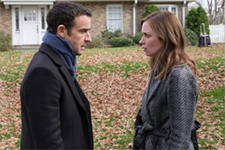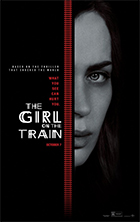The Girl on the Train
 | The Girl on the Train |
|  The eponymous protagonist of The Girl on the Train, which is based on the 15-million-and-counting bestseller by Paula Hawkins), is a woman named Rachel (Emily Blunt) who rides the commuter train into Manhattan from the suburbs outside of New York City every day (screenwriter Erin Cressida Wilson has, not surprisingly, changed the British novel’s London setting). And every day the train passes behind a row of gleaming white Cape Cods, into whose windows she is able to derive brief, fleeting glimpses of the lives inside. There is one house in particular the captures her attention, and she becomes obsessed with watching its occupants—an almost impossibly beautiful couple, Megan (Haley Bennett) and Scott (Luke Evans)—and wondering what they are thinking, feeling, and so on. They become a kind of dream figure for her, their seemingly luxuriant romanticism and material comfort contrasting with her dour, withdrawn mood and meager subsistence. The eponymous protagonist of The Girl on the Train, which is based on the 15-million-and-counting bestseller by Paula Hawkins), is a woman named Rachel (Emily Blunt) who rides the commuter train into Manhattan from the suburbs outside of New York City every day (screenwriter Erin Cressida Wilson has, not surprisingly, changed the British novel’s London setting). And every day the train passes behind a row of gleaming white Cape Cods, into whose windows she is able to derive brief, fleeting glimpses of the lives inside. There is one house in particular the captures her attention, and she becomes obsessed with watching its occupants—an almost impossibly beautiful couple, Megan (Haley Bennett) and Scott (Luke Evans)—and wondering what they are thinking, feeling, and so on. They become a kind of dream figure for her, their seemingly luxuriant romanticism and material comfort contrasting with her dour, withdrawn mood and meager subsistence.Because Rachel also narrates a great portion of the film, it isn’t long before we learn that her obsession with this house and its occupants is not accidental. Rather, Megan is working as a nanny for her neighbors two houses down, Tom (Justin Theroux) and Anna (Rebecca Ferguson), who are Rachel’s ex-husband and the woman with whom he had an affair and then married. We also quickly learn that Rachel is a despondent alcoholic whose addiction was largely responsible for the deterioration of her marriage to Tom, which she has never gotten over. Thus, her longing glimpses into the world outside the train is not so much a fantasy of what could be, but rather a lament for what she once had but then lost. That is all set-up, as the meat of the story pivots on the sudden disappearance of Megan, who Rachel suspects of cheating on Scott with her therapist, Dr. Kamal Abdic (Édgar Ramírez), something she takes as a deeply personal injury because Tom also cheated on her. Rachel is in the immediate vicinity when Megan disappears, and because she often blacks out after drinking, she has no idea what exactly has happened, which is why she becomes a suspect when Megan’s body is later discovered. Rachel can’t defend herself because she literally doesn’t know what she did or didn’t do, although she suspects that she may have somehow been involved because the morning after she woke up covered in blood (perhaps hers, perhaps Megan’s, and perhaps someone else’s). When a stern-faced detective played by Allison Janney questions her about that night, she admits that she is afraid of what she might have done, a possibility that is reinforced via flashbacks of her marriage to Tom when she would turn viciously violent when drunk. When it sticks primarily to Rachel’s story and her wretched mixture of guilt, remorse, anger, and sadness, The Girl on the Train is a quite effective psycho-drama. Blunt is particularly good as Rachel, with her red-rimmed eyes, constantly parched lips, and despondent stares conveying the self-loathing depths to which her life has sunk; when she tries to make small talk to a woman next to her on the train and coo at the woman’s baby, her instability and the clinking bottle of vodka in her bag immediately give her away. She is living an interlocking series of lies, telling her generous roommate (Laura Prepon) that she is going into the city each day to go to work when in actuality all she is doing is riding the train, drinking, and whiling away the hours in her own sauced delirium. The film doesn’t work nearly as well when it turns its attention to Megan, the siren-turned-victim, and Anna, the seemingly benign housewife, both of whom also narrate significant portions of the film. The clear intention is to make them into characters of some depth whose actual lives are much more complicated and sad than the fantasy Rachel has built around Megan and the animosity and envy she feels toward Anna, who essentially took her place. Unfortunately, both characters come off as slight and not particularly compelling, especially Megan, whose sordid backstory is a compendium of sad-sack clichés that chiefly serve to justify her sexuality. Director Tate Taylor, whose previous films were the civil rights dramedy The Help (2011) and the James Brown biopic Get On Up (2014), is working in some vastly different territory here, and he doesn’t always seem as fully comfortable and assured as he did in his previous efforts. He has clearly watched a lot of late-night psychological thrillers, as he douses the film in all the expected workings: sub-De Palma gauzy cinematography, shock cuts, flashbacks, false memories, distorted backstories, and sudden shifts in tone that underscore the film’s underlying theme of distrust. Perhaps in a bid to make us take seriously the film’s increasingly ludicrous plot developments, he slathers the whole thing with a layer of dour gravity that takes away any possibility of there being lurid or perverse fun in its story of voyeurism, paranoia, and betrayal (Hitchcock would have found some). (Spoiler warning: If you don’t want any hints as to how the film turns out, stop reading now.) Everyone is guilty in some way or another—it’s just that some are more guilty than others—and the film eventually peels through its interlocking narrative layers to reveal that the true villainy is nothing less than good ol’ fashioned patriarchal violence. The problem isn’t so much consumption as it is the masculine assumption that women exist for men’s pleasure, and when they prove problematic they must be cast off, dismissed, manipulated into compliance, or even murdered. The Girl on the Train teases with the idea of feminine violence borne out of the rage of the rejected, but it is ultimately an utterly conventional depiction of the horrors of the male prerogative. Copyright ©2016 James Kendrick Thoughts? E-mail James Kendrick All images copyright © DreamWorks SKG |
Overall Rating: 

 (2.5)
(2.5)

